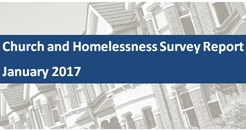 Church and homelessness survey report
Church and homelessness survey report
At the end of 2016, Church Housing Trust, Housing Justice and Word on the Streets promoted research in the UK on how churches are responding to the needs of homeless people.
Churches across the UK are involved with individuals on their journey out of homelessness. This is not just trying to help them find accommodation but involves other social actions such as improving life skills such as literacy, night shelters, addiction groups, etc. This is because homelessness is a complex problem that often has multiple causes which play out on an individual level. Many people who experience homelessness face a number of complex and overlapping issues, such as drug and alcohol addiction, mental health problems, childhood trauma, poverty and destitution. And this is the visible part of homelessness, let alone people who are in emergency accommodation, 'sofa surfing', etc.
The purpose of the survey was to find out what churches are doing for homeless people and the challenges they face in meeting the seemingly increasing demand. The information will be used to inform church leaders and policy makers about the role the church community is playing, and the support and resources needed.
What were the key findings?
Churches who responded to the survey have seen increases in various aspects of homelessness in the last 12 months.
The top aspects that have increased visibility are:
-
Visible rough sleeping on the streets
-
Individuals and families staying on friend’s sofas
-
An increasing number of privately rented properties
-
Begging and anti-social behaviour from rough sleepers
-
Young adults unable to leave home
73.7% of churches have callers who are experiencing homelessness come to their church for help either once or twice a week (42.1%) or every day (31.6%).
Churches are helping 18 (mean) people per week. This involves 20 (mean) volunteers per week. Smaller churches seem to be punching above their weight given their membership.
Churches are seeing a challenging level of demand regardless of the level of deprivation in the area.
The categories of people who are experiencing homelessness come to churches for support are mainly:
-
People suffering from addiction
-
Single men
-
People primarily with mental health issues
-
Ex-offenders
-
Victims of domestic violence
-
Migrants from the European Economic Area (EEA)
-
Refugees / asylum seekers
-
Veterans
Churches do not turn people away but help those experiencing homelessness mainly as follows:
-
Put them in contact with statutory services
-
Our church runs social actions which involve homeless people
-
Give them food, clothes or other items
-
Direct them to a local service run by another church
-
Allow them to shelter in the church
The top 10 social actions run by churches for people who are experiencing homelessness are:
-
Food distribution
-
Meals for needy
-
Clothes/goods distribution
-
Helping homeless get settled
-
Night Shelter
-
Addiction (inc. alcohol and drug abuse)
-
Street patrols
-
Fundraising for homeless charities
-
Helping jobless back into work
-
Washing facilities
If churches are involved in supporting the homeless, this involves a set of complementary actions. The primary ones are short-term e.g. food, clothes. Then if churches go further they move to longer-term actions, e.g. housing, addiction, life skills, debt counselling, etc.
Funding for such support comes from:
-
Donations from congregation 94.6%
-
Church financed 62.2%
-
Donations from local businesses, groups and individuals 56.8%
-
Grant-giving trusts 40.5%
-
Council / Government / Local authority 13.5%
The top challenges for churches helping people experiencing homelessness are:
-
Lack of appropriate accommodation and storage
-
Lack of understanding or concern for homeless people in the community
-
Lack of support from local services
-
Lack of funding
Homeless people need and appreciate most:
-
Being treated as human beings, respect, being listened to, someone to talk to, friendliness, care.
-
Warmth, accommodation, shelter.
-
Hot food.
Regarding homelessness, top actions that churches should be doing:
-
Working together locally to link facilities, resources, actions, communication, etc.
-
More widely - sharing experiences, forums, networking, training, understanding the deeper issues, etc.
-
Opening up church facilities as night shelters, soup kitchens, meeting places.
-
Encouraging all Christians to stop and talk to the homeless, treat with respect.
-
Purchasing accommodation.
Regarding homelessness, top things the church community should say to the government are:
-
Invest more in prevention, rehab, mental health, care, education. Increase tax on alcohol, decrease access. Have a tax to deal with these issues. Divert spending on civic cosmetics e.g. bowling greens, etc.
-
Build/provide housing/accommodation for the vulnerable. Low rent (capped). Gives a solid foundation.
-
Calculate real costs to society. Stop short-termism, stop cutting money - see cost effective in long-term to deal with issues. Recognise complexity. Recognise contribution to society many people who experience homelessness have made e.g. veterans. People have stories.
Download report
here.
Retweet about this article:
Geoff Knott, 18/01/2017